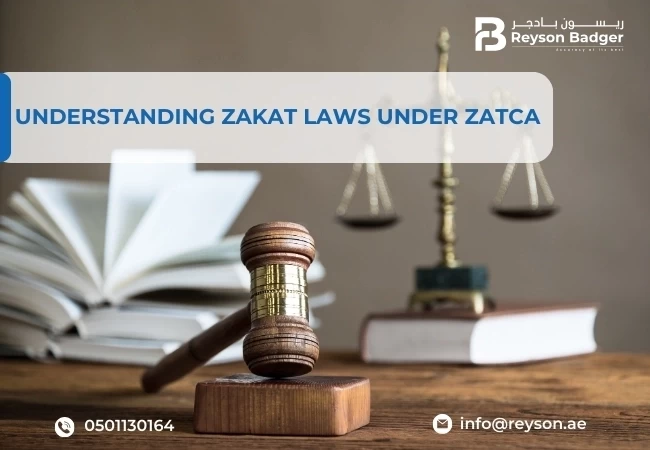Understanding Zakat Laws Under ZATCA
Written By Akshaya Ashok, Reviewed By Nouphal P C
Published on 10/12/2024

Zakat is a dominant Islamic pillar whereby every Muslim is obliged to share his wealth with the poor. Besides this, Zakat serves an overwhelmingly vital role in enhancing social justice, equity, and the local economy. The Zakat, Tax, and Customs Authority (ZATCA) is the body in Saudi Arabia responsible for collecting and disbursing Zakat while being faithful to the practice of Islam and regulatory compliance. ZATCA guidelines can potentially reach far-reaching implications for zakat payers, businessmen, and charities to streamline zakat payment processes and make them more transparent. This blog aims to deeply understand zakat laws under ZATCA, examining key regulations, obligations, and exemptions guiding compliant zakat payment and reporting.
Zakat Obligations
Zakat is one of the Five Pillars of Islam, a form of mandatory almsgiving and religious tax. Zakat cleanses wealth by passing it on to the needy, ensuring social welfare without causing inequalities within the community. Zakat giving is more than just alms; it represents the faithfulness of a Muslim in the fulfillment of helping others, as well.
For Whom is Zakat Payable?
To whom Zakat should be paid will be explained step by step. All sane adult Muslims whose wealth exceeds the nisab have to pay Zakat. The nisab is calculated according to the present gold and silver market price, which is approximately 87.48 grams of gold or 612.36 grams of silver. He must have held this amount of wealth for a lunar year before the Zakat became payable.
Types of Wealth that can be subjected to Zakat
Zakat can be levied on various forms of wealth, such as the following:
- Money: Bank balances and cash.
- Gold and Silver: Physical assets in the form of ornaments and bullion.
- Shares and investments: Stocks of companies and other financial securities.
- Business Assets: Fixed capital and profits on business account.
- Income from Properties: Rental income on investment properties but not the income for the personal houses.
The basic Zakat rate is 2.5% of total surpluses above the nisab threshold. To calculate Zakat:
- Total your assets (cash, gold, stock, etc.)
- Subtract liabilities (debts)
- If the positive difference exceeds the nisab threshold, then calculate 2.5% of that
- For instance, imagine that an individual has assets valued at $10,000 and $1,000 in debt
- Netting = $10,000 - $1,000 = $9,000
- If above the nisab threshold $9,000 Zakat payable =0.025×9,000=225
ZATCA Zakat Regulations
- Registration of Zakat Payers
The nisab threshold set under the regulations of Zakat, Tax and Customs Authority (ZATCA) in Saudi obliges anyone whose property is above the said threshold to register to pay the Zakat. Upon registering, one is guaranteed to comply with the prevailing local laws on the payment of Zakat.
- Zakat Declaration and Payment Procedure
Zakat payers must declare their taxable wealth annually and pay their Zakat through officially designated channels of ZATCA. Doing so usually requires filling specific forms with information on sources of income and asset valuations.
- Deadlines and Sanctions against Non-Payers
Zakat is expected to have strict deadlines for the declaration and payment of Zakat. Non-compliance with this deadline may result in penalties such as fines or extra charges depending on the amount or period of delay.
- Exemptions and Exclusions
Some will be exempted from Zakat payment. These include;
- Individuals whose wealth amounts fall below nisab.
- Certain types of assets are not eligible for zakat, including personal property used to sustain a living.
Zakatable Assets
Cash and bank balances are one of the first types of assets that are subject to Zakat. This includes:
- Cash in hand: Money physically held.
- Bank Accounts: Savings, cheques, and other types of accounts.
- Investments in Liquid Assets: Any liquid cash equivalent easily convertible into cash.
The entire amount of cash and bank balances is computed at the end of the lunar year to compute the amount of Zakat payable.
- Gold and Other Precious Metals
Gold and other precious metals (including silver) are eligible for zakat. This includes:
- Jewellery: Gold and silver jewelry except jewelry used as personal adornment and with special considerations.
- Bullion: Investment grade gold or silver bars.
- Coins: Any gold or silver coins held as an investment.
The value of these assets is determined by the current market price at the date of calculation.
Stock and share investments are eligible for zakat. This comprises:
- Listed shares: Shareholding in companies quoted on stock exchanges.
- Unit trusts: Pooling of savings with others to invest in a diversified portfolio of stocks or bonds.
Zakat is computed on the current market value of these investments on the last day of the lunar year.
- Real Estate and Investments
Real estate is eligible for zakat if the following criteria are fulfilled:
- Investment Properties: A property, therefore, held to generate rental income or capital appreciation is eligible for zakat
- Vacant Land: Vacant land held as an investment is also subject to zakat
Personal residences in which one resides are generally not eligible for zakat
- Business Assets and Inventory
Business assets which include inventory, machinery, and equipment, used to generate revenue, are subject to zakat. Such include:
- Inventory: Goods held for sale in business.
- Current Receivables: The sum of money owing to the business by the customers (debtors).
Zakat is then determined from the net value of these assets after deducting liabilities connected to business operations.
Zakat Exemptions
- Personal Necessities and Goods
These are not subject to zakat:
- Clothing: Everyday clothing that is used in the person's daily life.
- Household Goods: Household furniture and domestic appliances.
- Private Transportation: A car that is personally used for transportation and not employed for any business.
These are considered necessities, not a source of wealth.
Another factor in calculating zakat is debt:
- Debtor: If you owe another person money, then its amount is subject to zakat because it forms part of your zakat assets. However, if the debt recovery doubt is significant and outstanding, it can be excluded from the computation.
- Creditor: If you owe someone, this debt can be subtracted from your overall assets in Zakat computation.
- Any contributions made to charities before the date used in computing Zakat do not contribute to Zakat assets. Contributions made after Zakat has been calculated do not reduce or decrease the amount due.
- Exceptions for Specific Individuals
Some individuals are exempted from paying Zakat for specific reasons:
Disabled people:
- Those people who have suffered from some form of disability and lack appropriate means of meeting Zakat payments.
- It further encompasses elderly people, who may be exempt due to their income or pension that is fixed.
Steps for Zakat Calculation
Determine Total Zakatable Wealth:
- Add all the assets that are liable to zakat and these include cash, gold, silver, stocks, real estate, investment properties, or business assets.
- Deduct all liabilities or debts to get the net zakat amount
Verify against Nisab:
- Compare the net zakat wealth with the Nisab threshold which stands currently at about 87.48 grams of gold or 612.36 grams of silver. If the total exceeds then Zakat is payable.
Calculate Zakat Amount:
The common rate that is used for the total zakat that exceeds the Nisab threshold is 2.5%. It can also be calculated using the following formula:
Zakat=Total Zakatable Wealth×0.025
Example: If a person has a total eligible zakat wealth of 20,000 dollars:
Zakat=20,000×0.025=500
Payment Channels
There are various ways of making payments and modes through which Zakat can be paid.
- Direct Payment: Individuals can pay the Zakat directly to those eligible recipients, including the poor or charity.
- Online Portals: Many organizations provide online Zakat calculators and payment channels; therefore, it is easy to calculate and give.
- Installments: Even if Zakat is normally paid in one installment annually, it is permissible to pay it in installments during the year if it is finished by the year in the lunar calendar.
Recording Requirements
To calculate Zakat correctly and be in compliance, these steps ought to be kept
- Record applicable for zakat assets and their value.
- Liabilities Record liabilities or debts and obligations.
- This is payment records: Every Zakat remittance received should be supported by receipts or confirmations for accountability.
ZATCA Audit and Enforcement
Zakat Audit Procedures
The Zakat, Tax and Customs Authority (ZATCA) audits for compliance with its zakat regulations:
- Along with checks on the zakat wealth declared, the transaction, and declarations filed by individuals and companies, audits may also include financial record checks.
- The ZATCA may also ask for other supporting documents that testify to the correctness of the declared eligible zakat wealth.
Penalties for Non-Compliance
Non-compliance with zakat may attract considerable penalties:
- Late payments may be penalized in terms of the amount owed or delay.
- Higher penalties, like litigation, can be used in case of material non-compliance or even fraud.
Appeals Procedure for Zakat Disputes
ZATCA's ruling can be appealed by anyone or other refusing to pay Zakat or who objected to a ZATCA ruling concerning his Zakat duties:
- Appeals must be filed within several days following receipt of notice of non-compliance and fines.
- The appeal process often involves evidence and supporting documentation put before a review board specifically designated by ZATCA for that purpose.
Conclusion
Understanding Zakat laws under ZATCA, therefore, becomes very important for the citizens of Saudi Arabia, companies, as well as social welfare institutions. Observing Zakat regulations ensures not only spiritual satisfaction but also prevents penalties and reputational risks. A proper understanding of the essential concepts, obligations, and exclusions framed in this blog will enable entities to easily handle the web of Zakat laws. In any case, since Zakat regulation is dynamic, expert advice must be resorted to. Get Zakat solutions customized with accurate calculations and smooth compliance. With in-depth knowledge of ZATCA principles and Islamic principles, Reyson Badger ensures that your Zakat obligations are met with confidence and accuracy.

Written By
Akshaya Ashok
Akshaya Ashok is a content writer specializing in creating content focused on accounting and auditing. With over two years of experience, she has developed expertise in crafting professional content for the financial sector.

